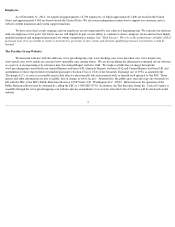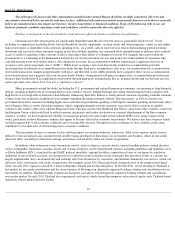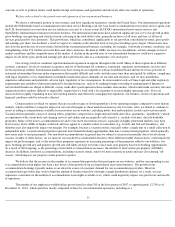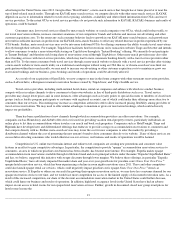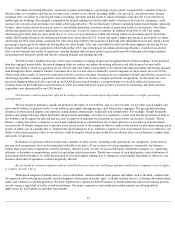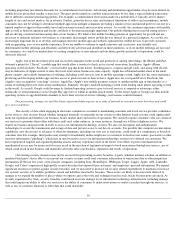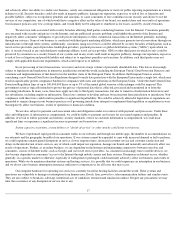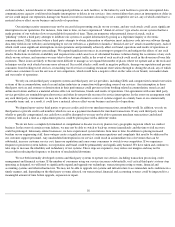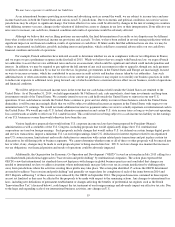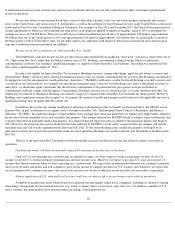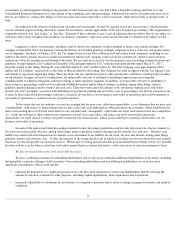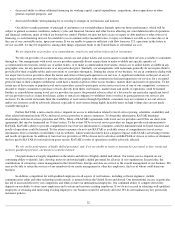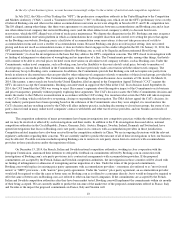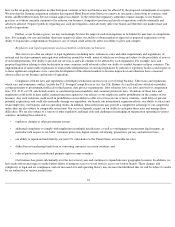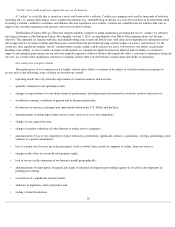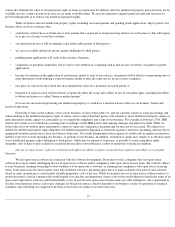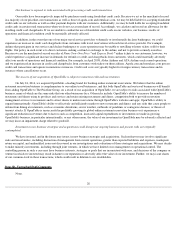Priceline 2014 Annual Report Download - page 22
Download and view the complete annual report
Please find page 22 of the 2014 Priceline annual report below. You can navigate through the pages in the report by either clicking on the pages listed below, or by using the keyword search tool below to find specific information within the annual report.
such misconduct, natural disaster or other unanticipated problems at such facilities, or the failure by such facilities to provide our required data
communications capacity could result in lengthy interruptions or delays in our services. Any system failure that causes an interruption or delay in
service could impair our reputation, damage our brands or result in consumers choosing to use a competitive service, any of which could have a
material adverse effect on our business and results of operations.
Our existing security measures may not be successful in preventing attacks on our systems, and any such attack could cause significant
interruptions in our operations. For instance, from time to time, we have experienced "denial-of-service" type attacks on our systems that have
made portions of our websites slow or unavailable for periods of time. There are numerous other potential forms of attack, such as
"phishing" (where a third party attempts to infiltrate our systems or acquire information by posing as a legitimate inquiry or electronic
communication), SQL injection (where a third party attempts to obtain information or otherwise insert malicious code into our software through
data entry fields in our websites) and attempting to use our websites as a platform to launch a "denial-of-
service" attack on another party, each of
which could cause significant interruptions in our operations and potentially adversely affect our brand, operations and results of operations or
involve us in legal or regulatory proceedings. We expend significant resources in an attempt to prepare for and mitigate the effects of any such
attacks. Reductions in website availability and response time could cause loss of substantial business volumes during the occurrence of any such
attack on our systems, and measures we may take to divert suspect traffic in the event of such an attack could result in the diversion of bona fide
customers. These issues are likely to become more difficult to manage as we expand the number of places where we operate and as the tools and
techniques used in such attacks become more advanced. Successful attacks could result in negative publicity, damage our reputation and prevent
consumers from booking travel services, researching travel services or making restaurant reservations through us during the attack, any of which
could cause consumers to use the services of our competitors, which would have a negative effect on the value of our brands, our market share
and our results of operations.
We rely on certain third party computer systems and third party service providers, including GDSs and computerized central reservation
systems of the accommodation, rental car and airline industries in connection with providing some of our services. Any interruption in these
third party services and systems or deterioration in their performance could prevent us from booking related accommodation, rental car and
airline reservations and have a material adverse effect on our business, brands and results of operations. Our agreements with some third party
service providers are terminable upon short notice and often do not provide recourse for service interruptions. In the event our arrangement with
any such third party is terminated, we may not be able to find an alternative source of systems support on a timely basis or on commercially
reasonable terms and, as a result, it could have a material adverse effect on our business and results of operations.
We depend upon various third parties to process credit cards for our merchant transactions around the world. In addition, we rely on
third parties to provide credit card numbers which we use as a payment mechanism for merchant transactions. If any such third party were
wholly or partially compromised, our cash flows could be disrupted or we may not be able to generate merchant transactions (and related
revenues) until such a time as a replacement process could be put in place with a different vendor.
We do not have a completely formalized or comprehensive disaster recovery plan in every geographic region in which we conduct
business. In the event of certain system failures, we may not be able to switch to back-up systems immediately and the time to full recovery
could be prolonged. Like many online businesses, we have experienced system failures from time to time. In addition to placing increased
burdens on our engineering staff, these outages create a significant amount of consumer questions and complaints that need to be addressed by
our customer support personnel. Any unscheduled interruption in our service could result in an immediate loss of revenues that can be
substantial, increase customer service cost, harm our reputation and cause some consumers to switch to our competitors. If we experience
frequent or persistent system failures, our reputation and brand could be permanently and significantly harmed. We have taken and continue to
take steps to increase the reliability and redundancy of our systems. These steps are expensive, may reduce our margins and may not be
successful in reducing the frequency or duration of unscheduled downtime.
We use both internally developed systems and third-party systems to operate our services, including transaction processing, order
management and financial systems. If the number of consumers using our services increases substantially, or if critical third-party systems stop
operating as designed, we will need to significantly expand and upgrade our technology, transaction processing systems, financial and
accounting systems and other infrastructure. We may not be able to upgrade our systems and infrastructure to accommodate such conditions in a
timely manner, and, depending on the third-party systems affected, our transactional, financial and accounting systems could be impacted for a
meaningful amount of time before upgrade, expansion or repair.
18



